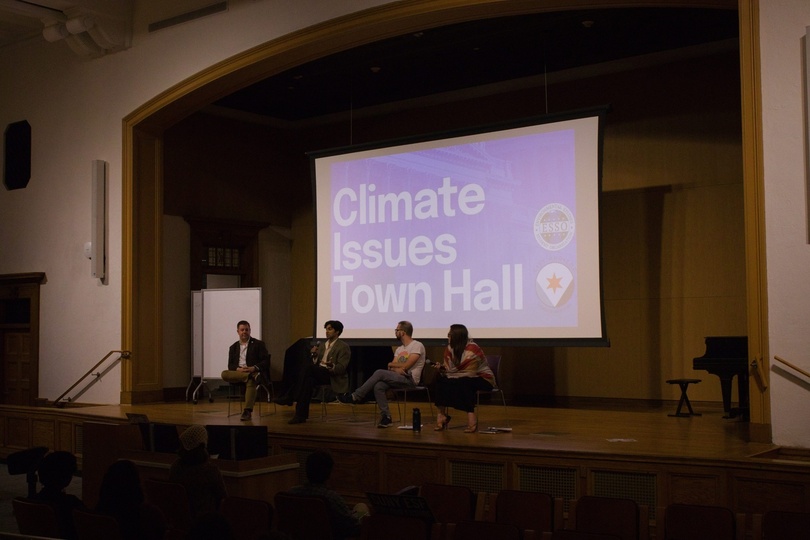SUNY ESF’s Environmental Studies Student Organization hosts climate change panel

SUNY ESF’s Environmental Studies Student Organization hosted City Auditor Alex Marion and panelists to discuss current climate issues facing the federal government. Ashley Glode | Contributing Photographer
Get the latest Syracuse news delivered right to your inbox.
Subscribe to our newsletter here.
SUNY ESF’s Environmental Studies Student Organization hosted Syracuse City Auditor Alex Marion and other panelists to discuss current climate issues facing the federal government during a Wednesday evening town hall.
Chie Togami and Michael Mikulewicz, both assistant professors in ESF’s department of Environmental Studies, and environmental justice expert Saad Amer discussed the climate crisis, creating a space for open dialogue to share feelings on climate change and explore the work that can be done.
Marion emphasized that the intersection of the climate crisis and public policy forces the public to address the issue. Panelists talked about their fears regarding the Environmental Protection Agency’s policy cuts and the work at the federal level, which Marion called“absolutely unacceptable.”
The panel stressed the importance of public engagement, specifically within local government. Marion said creating dialogue with local public officials makes public policy responsive to the community’s concerns.
“The advice I give everyone: make sure that you know your elected officials and make sure that they know you. The more that people like me see you and hear you,” Marion said. “Anytime I can get a room full of eager people willing to talk about how we approach climate change and climate policy.”
Natallie Cox, a sophomore at ESF majoring in forest ecosystem science, attended the panel as a student on behalf of New York Public Interest Research Group. Coming to the town hall, she wasn’t sure what would be shared, but the “well-rounded” conversations were useful in learning how essential unity is in fighting the climate crisis, she said.
“I wanted to be more involved and learn more about what actions are being taken to do stuff with the climate crisis,” Cox said. “I just want to be more informed on things that I can do more through my organization and as a student.”
Amer emphasized the importance of voting and public engagement, specifically after the federal government halted its support of the EPA in March.
Amer also criticized the agency’s ambassador, Lee Zeldin’s, choice to roll back 31 federal climate change policies, specifically the endangerment finding. The finding was established in 2009, affirming that climate change is causing harm to human health through carbon, methane and other air pollutant emissions as outlined in the Clean Air Act.
Amer and other panelists said citizens should take advantage of the agency’s extended public open comment period, where community members can contact the EPA directly with their thoughts on its developments until Sept. 22.
Students and the broader community need to “stay very vigilant” about everything happening at the federal level, Amer said.
“It’s devastating to see all these rollbacks happening and starting to happen more frequently and with more fervor,” he said.
Originally from Poland, Mikulewicz, called the rollbacks an “assault on federal regulation.”
“My concern is that when the regime changes, all of this will not be undone, because everything that Trump is doing now can be undone,” Mikulewicz said.
Mikulewicz said Poland went through a similar conservative federal government, cutting climate change acts. With a change in leadership, the Supreme Court of Poland is now attempting to “undo” these rollbacks. He believes the United States can see the same future in fighting climate change.
“So pressure on them to not be timid, to be bold after the regime changes, because it will change,” Mikulewicz said. “I don’t necessarily believe the cynical arguments that democracy is dead here and that there will not be another election.”
Togami, echoed Mikulewicz’s sentiments, saying she fears the “nihilism” people fall into when talking about the climate crisis.
“It can feel so dark right now,” Togami said. “Whenever I feel myself sinking into that place, I think we cannot give up if people were fighting for decades against the onslaught of toxic racism, and they kept fighting, we can’t give up.”
Cox said she was especially moved by the speaker’s ideas on finding allyship to fight the climate crisis.
“We are weak unless we band together. You can have all the belief in yourself and wanting to do things yourself. It doesn’t really mean anything unless you’re working with other people to do it,” Cox said.





